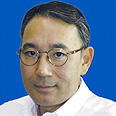
Matsuda.
באדיבות שגרירות יפן
Japan puts denuclearization at center of G8 summit
Ahead of Japanese-hosted summit, Japan puts ban on nuclear proliferation high on priority list. Other issues include food crisis, Middle East talks, Afghanistan war, Darfur
The summit of the group of eight industrialized nations (G8) will be held in the Japanese Island of Hokkaido on July 7-9, focusing on the global efforts to prevent the distribution of nuclear arms – as Japan's Deputy Ambassador to Israel Kuninori Matsuda said Thursday.
In a press conference with Israeli reporters one month ahead of the summit, Matsuda said that in light of Japan’s modern history, its policy is clear about not allowing the supply of nuclear weapons, and is being backed up by the country’s parliament and public. Therefore, Japan has decided as the annual summit host, to place the subject matter at the top of the conference’s agenda.
“As part of addressing this issue, we will discuss the negotiations for the denuclearization of North Korea, naturally followed by the international attempts to stop the Iranian nukes,” said Matsuda. He also signaled that the leaders will discuss US intelligence indicating Syria has a clandestine nuclear program – if IAEA inspectors are able to visit the country and publish their report by then.
Other political matters on the agenda are the Israeli-Palestinian peace talks, the war in Afghanistan and the ongoing struggle in Darfur. The summit will also discuss economic and climate-related matters, the global food crisis and the sharp rise in fuel prices.
Matsuda also mentioned the meeting between Japanese Prime Minister Yasuda Fukuda and Iranian President Mahmoud Ahmadinejad, in which Fukuda called upon Ahmadinejad to make a “brave decision” and stop the illicit nuclear program, primarily Uranium enrichment, promising to help Tehran in the energy field so as to encourage it to stop seeking nuclear technology.
Ahmadinejad in turn repeated the official Iranian position by which Tehran is neither looking to obtain nukes nor use such weapons – though as expected, he declared the country’s intention of continuing its nuclear program.
As for the food summit, Matdusa added that prime minister Fukuda expressed his willingness to provide emergency aid of up to $100 million to help the areas suffering from food shortages. Japan also announced it will deviate from its policy and allot 300 million tons of rice to help reduce the rising cost of rice. This is despite Japan’s tradition of not exporting its rice and using it for local consumption only.










